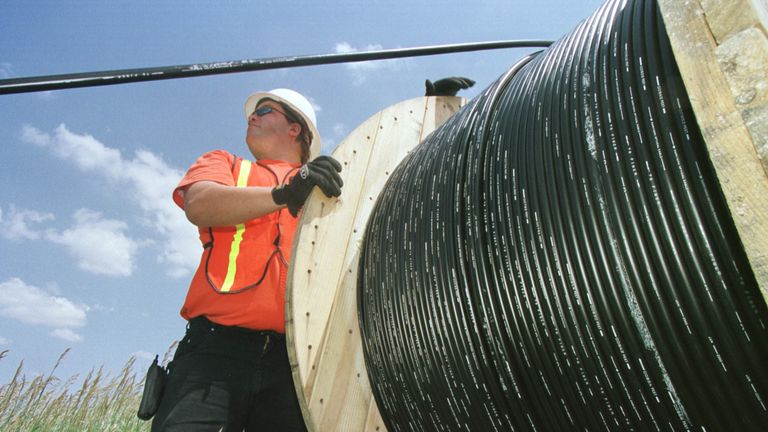New record internet speed could download 10,000 HD films per second
Using a device called a micro-comb, the researchers clocked internet speeds millions of times faster than the UK average.
Friday 22 May 2020 13:41, UK
Researchers claim they have set a new record for the fastest ever internet speed, capable of downloading 1,000 HD movies in under a second.
Scientists in Australia say they managed to clock 44.2 terabits per second (Tbps) - millions of times faster than the average broadband speed in the UK, which is around 64 megabits per second (Mbps).
Such speeds had only been achieved in laboratory settings until now, but the system was able to work on Australia's fibre optic network - used by internet companies to deliver high-speed broadband to customers.
The team broke the record using the existing infrastructure thanks to a single device called a micro-comb, which replaces the 80 lasers in current telecommunications hardware.
The micro-comb is essentially a laser source, described as "like a rainbow made up of hundreds of high quality infrared lasers" and produced by a single chip.
Each laser, or specific frequency of light which is being beamed, has the capacity to be used as a separate communications channel.
While it was able to work on Australia's fibre optic network, unfortunately much of the UK's telecommunications infrastructure still relies on copper wires.
Dr Bill Corcoran, co-lead author of the peer-reviewed study, said: "We're currently getting a sneak peek of how the infrastructure for the internet will hold up in two to three years' time, due to the unprecedented number of people using the internet for remote work, socialising and streaming."
"It's really showing us that we need to be able to scale the capacity of our internet connections," added Dr Corcoran, who is a lecturer in electrical and computer systems at Monash University.
"What our research demonstrates is the ability for fibres that we already have in the ground, [thanks to Australia's National Broadband Network], to be the backbone of communications networks now and in the future."
Dr Corcoran added: "We've developed something that is scaleable to meet future needs.
"And it's not just Netflix we're talking about here - it's the broader scale of what we use our communication networks for.
"This data can be used for self-driving cars and future transportation and it can help the medicine, education, finance and e-commerce industries, as well as enable us to read with our grandchildren from kilometres away."
Professor Moss, director of the Optical Sciences Centre at Swinburne University, said: "In the 10 years since I co-invented micro-comb chips, they have become an enormously important field of research.
"It is truly exciting to see their capability in ultra-high bandwidth fibre optic telecommunications coming to fruition.
"This work represents a world-record for bandwidth down a single optical fibre from a single chip source, and represents an enormous breakthrough for part of the network which does the heaviest lifting.
"Micro-combs offer enormous promise for us to meet the world's insatiable demand for bandwidth."
The research has been published in the journal Nature Communications.






